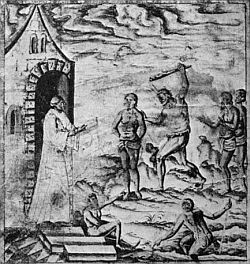 (HOST) This week, as part of VPR’s special Champlain 400 programming, commentator Mike Martin is looking through the "Eyes of Champlain." Today, he considers the importance of religion in Champlain’s life and work.
(HOST) This week, as part of VPR’s special Champlain 400 programming, commentator Mike Martin is looking through the "Eyes of Champlain." Today, he considers the importance of religion in Champlain’s life and work.
(MARTIN) Before coming to the New World, Samuel de Champlain survived France’s long, bloody religious wars. Just a few years before he was born, Catholic mobs slaughtered thousands of Protestants during the Saint Bartholomew’s Eve Massacre. The Catholic King of France, Charles IX, reportedly said, "Kill them all, so that no one will be able to reproach me for it."
The French Protestants fled in droves, and Charles IX died of tuberculosis – or possibly poison – shortly thereafter. His successor, Henri III, died on the toilet, stabbed to death by a radical monk. Henri IV, the next king, was a Protestant who converted to Catholicism to unify France. Champlain fought as a soldier in the Wars of Religion, until finally, in 1598, Henri IV enacted the Edict of Nantes, which brought religious tolerance to France – for a while.
So when Champlain left for New France he was probably hoping to leave the chaos of religious conflicts behind him. But on his second voyage a Protestant minister and Catholic priest came along, and in Voyages to Western New France, Champlain recounts with amusement how the two debated religion with their fists while the Native Americans chose sides. Ultimately, neither survived the harsh winter, and the survivors buried them in a shared grave with a joke about hoping they would get along better in the afterlife.
Of course, it’s not that Champlain didn’t value religion; he was simply against religious strife. As a devout Catholic, he definitely objected to some Native American customs, such as nude dancing, open marriages, torture, and cannibalism; but in his journal he only condemns the sin – not the sinner – for these unchristian practices. If only the Christian factions in Europe had shown such tolerance!
At the same time, Champlain believed that the Native Americans’ souls were a treasure worth more than land or minerals. In Champlain’s Voyages, he claims that, "The conversion of an infidel is worth more than the conquest of a kingdom."
So while others preferred filling their boats with furs to building settlements, Champlain wanted to build a new colony where the French and local peoples would live together. He writes that those he encountered, "…would very soon be brought to Christianity if people were to come to their country to live and to cultivate it, as most of them would like." And the missionaries who followed Champlain shared his optimism for a new society. For example, Father Sagard remarked that, "If the savages were Christians, they would be better Christians than we are, for they possess moral virtues which make us often admire them."
Leaving the carnage of Europe’s religious wars behind him, Champlain sought to spread Christianity, not at sword point like the conquistadors, or through enslavement like Columbus, but by patiently building alliances and modeling Christian behavior. One could say that in New France Champlain always tried to honor the commandment about loving your neighbor – even if he was new to the neighborhood.
View the entire series, Champlain 400: Through the Eyes of Champlain »